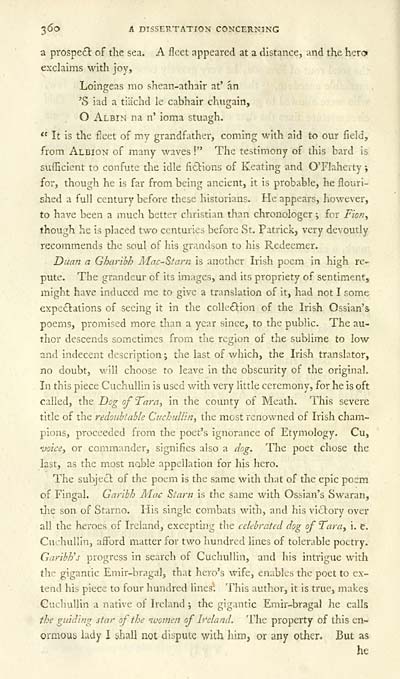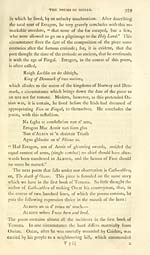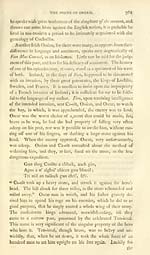Download files
Complete book:
Individual page:
Thumbnail gallery: Grid view | List view

3<5o A DISSERTATION CONCERNING
a prospect of the sea. A fleet appeared at a distance, and the hero
exclaims with joy,
Loingeas mo shean-athair at' an
'S iad a tiachd le cabhair chugain,
O Albin na n' ioma stuagh.
" It is the fleet of my grandfather, coming with aid to our field,
from Albion of many waves !" The testimony of this bard is
sufficient to confute the idle fictions of Keating and OTlahcrty j
for, though he is far from being ancient, it is probable, he flouri-
shed a full century before these historians. He appears, however,
to have been a much better christian than chronologer ; for Fiony
though he is placed two centuries before St. Patrick, very devoutly
recommends the soul of his grandson to his Redeemer.
Diian a Gharibh Mac-Starn is another Irish poem in high re-
pute. The grandeur of its images, and its propriety of sentiment,
might have induced me to give a translation of it, had not I some
expectations of seeing it in the colle6lion of the Irish Ossian's
poems, promised more than a year since, to the public. The au-
thor descends sometimes from the region of the sublime to low
and indecent description j the last of which, the Irish translator,
no doubt, will choose to leave in the obscurity of the original.
In this piece Cuchullin is used with very little ceremony, for he is oft
called, the Dog of Tarn, in the county of Meath. This severe
title of the redoubtable Cuchullin^ the most renowned of Irish cham-
pions, proceeded from the poet's ignorance of Etymology. Cu,
voicey or commander, signifies also a dog. The poet chose the
last, as the most noble appellation for his hero.
The subject of the poem is the same with that of the epic poem
of Fingal. Garlbh Mac Starn is the same with Ossian's Swaran,
the son of Starno. His single combats with, and his victory over
all the heroes of Ireland, excepting the celebrated dog of Taruy i. e.
Cuchullin, afford matter for two hundred lines of tolerable poetry.
Garibh's progress in search of Cuchullin, and his intrigue with
the gigantic Emir-bragal, that hero's wife, enables the poet to ex-
tend his piece to four hundred linesl This author, it is true, makes
Cuchullin a native of Ireland ; the gigantic Emir-bragal he calls
the guiding star of the women of Ireland. The property of this en-
ormous lady I shall not dispute with him, or any other. But as
he
a prospect of the sea. A fleet appeared at a distance, and the hero
exclaims with joy,
Loingeas mo shean-athair at' an
'S iad a tiachd le cabhair chugain,
O Albin na n' ioma stuagh.
" It is the fleet of my grandfather, coming with aid to our field,
from Albion of many waves !" The testimony of this bard is
sufficient to confute the idle fictions of Keating and OTlahcrty j
for, though he is far from being ancient, it is probable, he flouri-
shed a full century before these historians. He appears, however,
to have been a much better christian than chronologer ; for Fiony
though he is placed two centuries before St. Patrick, very devoutly
recommends the soul of his grandson to his Redeemer.
Diian a Gharibh Mac-Starn is another Irish poem in high re-
pute. The grandeur of its images, and its propriety of sentiment,
might have induced me to give a translation of it, had not I some
expectations of seeing it in the colle6lion of the Irish Ossian's
poems, promised more than a year since, to the public. The au-
thor descends sometimes from the region of the sublime to low
and indecent description j the last of which, the Irish translator,
no doubt, will choose to leave in the obscurity of the original.
In this piece Cuchullin is used with very little ceremony, for he is oft
called, the Dog of Tarn, in the county of Meath. This severe
title of the redoubtable Cuchullin^ the most renowned of Irish cham-
pions, proceeded from the poet's ignorance of Etymology. Cu,
voicey or commander, signifies also a dog. The poet chose the
last, as the most noble appellation for his hero.
The subject of the poem is the same with that of the epic poem
of Fingal. Garlbh Mac Starn is the same with Ossian's Swaran,
the son of Starno. His single combats with, and his victory over
all the heroes of Ireland, excepting the celebrated dog of Taruy i. e.
Cuchullin, afford matter for two hundred lines of tolerable poetry.
Garibh's progress in search of Cuchullin, and his intrigue with
the gigantic Emir-bragal, that hero's wife, enables the poet to ex-
tend his piece to four hundred linesl This author, it is true, makes
Cuchullin a native of Ireland ; the gigantic Emir-bragal he calls
the guiding star of the women of Ireland. The property of this en-
ormous lady I shall not dispute with him, or any other. But as
he
Set display mode to: Large image | Transcription
Images and transcriptions on this page, including medium image downloads, may be used under the Creative Commons Attribution 4.0 International Licence unless otherwise stated. ![]()
| Early Gaelic Book Collections > Ossian Collection > Poems of Ossian, the son of Fingal > (372) |
|---|
| Permanent URL | https://digital.nls.uk/77927842 |
|---|
| Description | Selected books from the Ossian Collection of 327 volumes, originally assembled by J. Norman Methven of Perth. Different editions and translations of James MacPherson's epic poem 'Ossian', some with a map of the 'Kingdom of Connor'. Also secondary material relating to Ossianic poetry and the Ossian controversy. |
|---|
| Description | Selected items from five 'Special and Named Printed Collections'. Includes books in Gaelic and other Celtic languages, works about the Gaels, their languages, literature, culture and history. |
|---|

